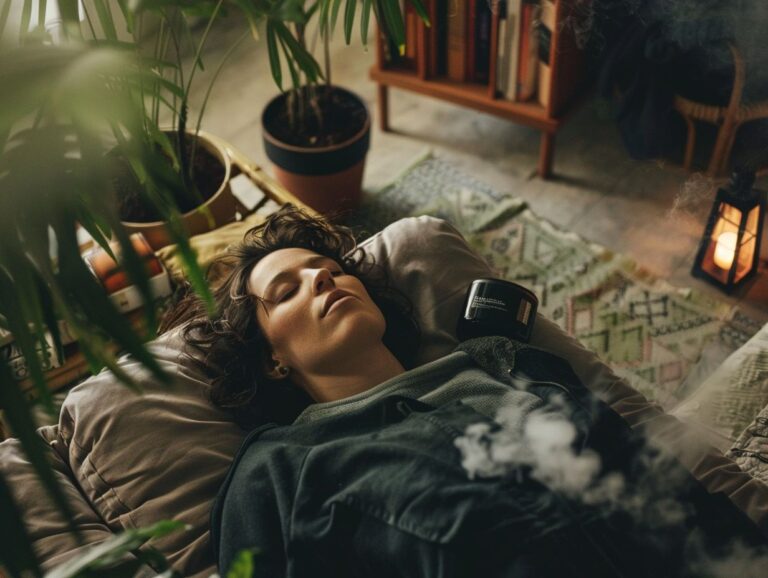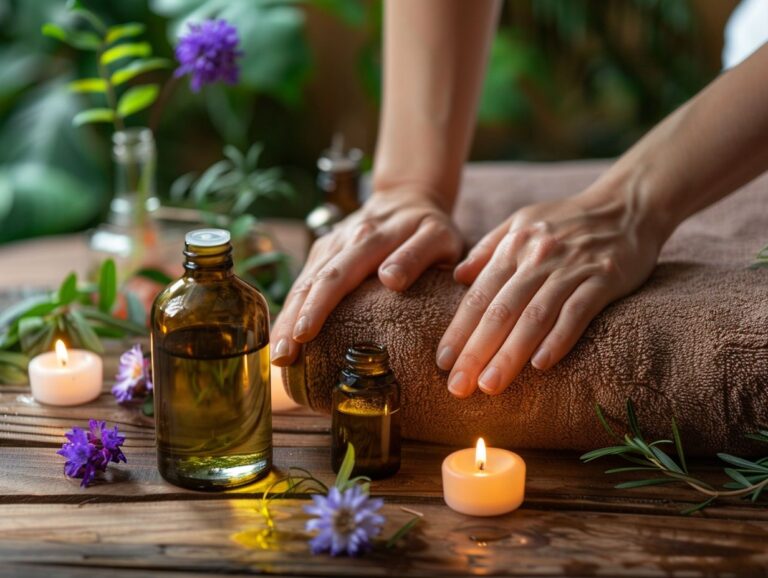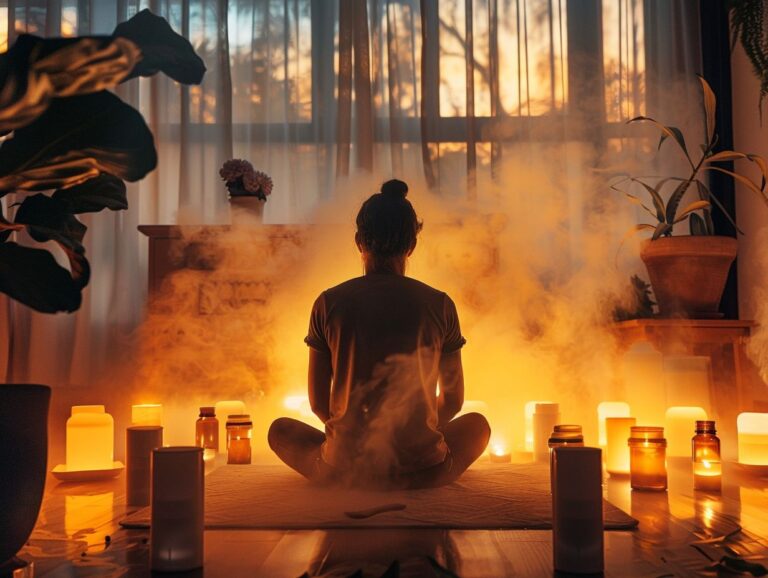Can Aromatherapy Make You Break Out
Curious about aromatherapy and its benefits? Essential oils have gained popularity for their therapeutic properties, but can they also cause breakouts?
We will explore what aromatherapy is, how it works, and the most common essential oils used. Discover the potential causes of breakouts from aromatherapy and learn how to prevent them.
We will also discuss the other benefits of aromatherapy, from stress relief to improved mood. Stay tuned to find out more!
Key Takeaways:
What Is Aromatherapy?
Aromatherapy is a holistic healing treatment that uses natural plant extracts, known as essential oils, to promote health and well-being. These essential oils are extracted from various parts of plants and have potent aromatic properties.
Historically, aromatherapy dates back thousands of years, with ancient civilizations like the Egyptians and Greeks utilizing aromatic plant oils for medicinal and spiritual purposes. The modern practice of aromatherapy, as we know it today, gained prominence in the 20th century, thanks to the pioneering work of French chemist Ren -Maurice Gattefoss .
Aromatherapy has gained widespread popularity for its range of potential benefits, including stress relief, improved sleep, mood enhancement, and even pain management. These essential oils can be used in various ways such as inhalation, topical application, and even in massage therapy.
While aromatherapy offers numerous advantages, it’s essential to note that some individuals may experience allergic reactions or skin sensitivities to certain essential oils. It’s crucial to dilute oils properly and consult with a trained aromatherapist for personalized guidance to prevent any potential drawbacks.
What Are Essential Oils?
Essential oils are concentrated liquids containing volatile aroma compounds from plants. They are commonly used in skincare products due to their various beneficial properties for the skin, such as anti-inflammatory and antibacterial effects.
Extracting essential oils involves methods such as steam distillation, cold-pressing, or solvent extraction. One of the popular essential oils used in skincare is lavender oil known for its soothing properties, aiding in calming irritated skin. Tea tree oil is another versatile option, famous for its antimicrobial qualities, making it effective against acne. Citrus oils like lemon and orange are prized for their brightening effects, ideal for treating dull skin. Incorporating essential oils in a skincare routine can enhance skin health and address various skin concerns.
What Are the Most Common Essential Oils Used in Aromatherapy?
Some of the most common essential oils used in aromatherapy include thyme, cinnamon, rosemary, tea tree, jasmine, lemon, and Eucalyptus. Each of these oils offers unique properties and benefits for both physical and emotional well-being.
Thyme oil, known for its antibacterial properties, is often used to improve respiratory health and boost immunity. Cinnamon oil, with its warming and stimulating effects, helps alleviate fatigue and uplift mood, making it a popular choice for stress relief. Rosemary oil is great for improving concentration and memory retention.
Tea tree oil is well-known for its ability to combat acne and soothe skin irritation, making it a staple in skincare products. Jasmine oil has a calming effect on the nervous system and is often used to reduce anxiety and improve sleep quality.
Lemon oil, with its refreshing citrus aroma, is a natural energizer and mood booster, while Eucalyptus oil is commonly used for its decongestant properties and as a pain reliever for muscle aches and joint pain.
How Does Aromatherapy Work?
Aromatherapy works by inhaling or applying essential oils to the skin, where their aromatic molecules are absorbed and can affect the body and mind. The therapeutic properties of these oils can help in treating various ailments and promoting relaxation.
Essential oils interact with the body through several pathways. When inhaled, these oils stimulate the olfactory system, sending signals to the brain’s limbic system, which is responsible for emotions and memories. This process can evoke feelings of calmness, reduce stress, and improve mood. Alternatively, when applied topically, essential oils can penetrate the skin and enter the bloodstream, allowing their healing properties to work internally. Aromatherapy offers multiple methods of application, including diffusers, inhalers, massages, and baths, making it versatile for different needs and preferences.
Can Aromatherapy Cause Breakouts?
Aromatherapy can potentially cause breakouts, especially in individuals with sensitive skin or prone to acne. Some essential oils may contain properties that can exacerbate acne or harbor bacteria, leading to skin reactions.
One significant factor to consider is the comedogenic rating of essential oils, which indicates their likelihood to clog pores. Oils with a high comedogenic rating can be problematic for acne-prone skin. Jojoba oil, for instance, has a low comedogenic rating and is less likely to cause breakouts.
Certain essential oils have strong fragrances or chemical compositions that may irritate the skin, triggering inflammation and breakouts. Lavender oil, although popular in aromatherapy, may be too harsh for sensitive skin.
To prevent breakouts caused by aromatherapy, it is crucial to perform a patch test before using any essential oil on the skin. Diluting oils with a carrier oil can also reduce the risk of skin reactions. Selecting non-comedogenic oils and avoiding highly fragrant ones can help maintain skin health when incorporating aromatherapy practices.
What Are the Possible Causes of Breakouts from Aromatherapy?
Breakouts from aromatherapy can be caused by essential oils that clog pores, promote bacterial growth (such as P. acnes or Cutibacterium acnes), or trigger inflammation in the skin. Understanding these potential causes can help in preventing adverse reactions.
Essential oils rich in citrus or lavender are often culprits for breakouts due to their high concentration levels, especially when applied undiluted or in excessive amounts. The interaction between these oils and skin bacteria can lead to the formation of comedones, also known as whiteheads and blackheads, exacerbating acne-prone skin.
Certain essential oils may disrupt the skin’s natural barrier function, increasing vulnerability to environmental pollutants and pathogens. It is crucial to choose skincare products with non-comedogenic oils and perform patch tests before incorporating new oils into your routine.
How Can You Identify if Aromatherapy is Causing Your Breakouts?
Identifying if aromatherapy is causing breakouts involves monitoring your skin’s reactions after using essential oils. Look for signs of increased acne, redness, or irritation. Keeping a skincare journal can help track the effectiveness of treatments like Tea Tree Oil (TTO) on breakouts.
It’s essential to observe how your skin behaves after introducing new oils or blends. If you notice more blemishes, especially in areas not prone to acne, it could be a sign of a reaction to aromatherapy products.
- Documenting each product used and your skin’s response can provide valuable insights.
- If Tea Tree Oil (TTO) worsens breakouts, it might not be suitable for your skin type.
Remember, everyone’s skin reacts differently, so what works for one person may not work for another.
How Can You Prevent Breakouts from Aromatherapy?
Preventing breakouts from aromatherapy involves choosing essential oils suitable for your skin type, performing patch tests before full application, diluting oils with carrier oils, and ensuring proper skincare regimen to maintain skin health.
When selecting essential oils, it is important to consider the specific needs of your skin, whether it’s dry, oily, combination, or sensitive.
Tea tree oil and lavender are generally well-tolerated by most skin types. Conduct a patch test by applying a small amount of diluted oil to a small area to check for any adverse reactions before proceeding with full application. Diluting essential oils with carrier oils like jojoba or almond oil helps reduce the risk of irritation. Incorporating a consistent skincare routine that includes cleansing, toning, and moisturizing can improve overall skin health and prevent breakouts from occurring.
What Precautions Should You Take When Using Essential Oils?
When using essential oils, it is essential to follow guidelines from reputable sources like the FDA, perform skin patch tests, dilute oils properly, and avoid direct contact with sensitive areas. Some essential oils have strong antibacterial and antimicrobial properties that require cautious use.
One of the highly regarded antimicrobial essential oils is Tea Tree oil, known for its ability to combat a wide range of bacteria, viruses, and fungi.
Proper dilution is crucial to prevent skin irritation or chemical burns, especially when using potent oils like Oregano or Cinnamon Bark. It is recommended to always store essential oils in dark, glass bottles away from sunlight to maintain their efficacy. Ensuring proper ventilation when diffusing oils can prevent respiratory issues, and consulting a healthcare professional before using oils during pregnancy is advisable.
Are There Any Alternative Essential Oils for Sensitive Skin?
For individuals with sensitive skin, alternative essential oils like bergamot, rose, chamomile, and ylang-ylang can be gentler options that offer soothing and calming effects without causing skin irritations.
These essential oils are known for their anti-inflammatory and antibacterial properties, making them ideal for reducing redness and irritation on sensitive skin.
- Bergamot oil, derived from the peel of bergamot oranges, is commonly used to balance oily skin and has a refreshing citrus scent.
- Rose oil, extracted from rose petals, is prized for its hydrating and anti-aging benefits.
- Chamomile oil, obtained from chamomile flowers, is renowned for its calming and soothing properties, perfect for soothing inflammation and redness.
- Ylang-ylang oil, extracted from the flowers of the Cananga tree, has a sweet floral aroma and is valued for its ability to balance oil production and promote skin regeneration.
These oils can be used in various ways in a skincare routine, such as added to a carrier oil for a relaxing massage, incorporated into a DIY facial serum, or diffused in a room for aromatherapy benefits.
What Are the Other Benefits of Aromatherapy?
Aside from skincare benefits, aromatherapy offers a range of other advantages, including stress relief, enhanced sleep quality, strengthened immune system, pain relief, and mood improvement. These effects make aromatherapy a versatile and holistic approach to well-being.
Research has shown that certain essential oils, such as lavender, chamomile, and peppermint, can help reduce anxiety and promote relaxation. In a study published in the Journal of Alternative and Complementary Medicine, it was found that inhaling lavender essential oil helped improve the quality of sleep in participants suffering from insomnia. The scent of citrus oils like lemon and orange can uplift mood and boost energy levels.
The anti-inflammatory properties of oils like eucalyptus and tea tree have been linked to pain relief and improved respiratory function. For example, a randomized controlled trial published in Pain Research and Treatment demonstrated that massaging a blend of essential oils on the affected area reduced pain intensity in patients with osteoarthritis.
Stress Relief
Aromatherapy is known for its stress-relieving properties, with essential oils like lavender, chamomile, and bergamot promoting relaxation and reducing anxiety levels when used in aromatherapy practices.
One of the key benefits of using essential oils for stress relief is their ability to activate the olfactory system, which can help signal the brain to relax and reduce tension. Lavender oil, for example, is well-known for its calming effects and is often used in diffusers or diluted with a carrier oil for massage purposes.
Similarly, chamomile essential oil is praised for its soothing properties, making it a popular choice for creating a tranquil atmosphere during stressful times. A few drops in a warm bath or added to a room spray can help promote relaxation and peace of mind.
Improved Sleep Quality
Aromatherapy can enhance sleep quality through essential oils such as lavender, cedarwood, and vetiver, which have sedative properties that induce relaxation and facilitate a restful night’s sleep.
Research studies have suggested that inhaling lavender essential oil can reduce insomnia and improve the overall quality of sleep. Similarly, cedarwood oil has been shown to promote soothing effects on the mind and body, aiding in falling asleep faster and staying asleep longer. The earthy tones of vetiver oil have been linked to reducing stress and anxiety, allowing individuals to unwind and prepare for a tranquil sleep experience.
Boosted Immune System
Certain essential oils used in aromatherapy, such as tea tree, eucalyptus, and lemon, possess antimicrobial properties that can support the immune system by combating harmful pathogens and strengthening the body’s defense mechanisms.
These essential oils work in different ways to enhance immune function. For instance, tea tree oil has been shown to exhibit powerful antibacterial and antiviral effects, making it effective in fighting off infections.
Eucalyptus oil, on the other hand, is known for its ability to clear respiratory congestion, which can help the body defend against respiratory infections and promote easier breathing.
Lemon oil is rich in antioxidants, which play a crucial role in neutralizing free radicals and reducing oxidative stress on the immune system, thus boosting overall wellness.
Pain Relief
Aromatherapy offers natural pain relief through essential oils like peppermint, eucalyptus, and rosemary, which possess anti-inflammatory properties that can alleviate muscle soreness, headaches, and various types of pain when applied or inhaled.
Peppermint oil, with its cooling effect, is beneficial for easing tension headaches and migraines. Eucalyptus oil is commonly used to relieve respiratory issues and joint pain due to its analgesic properties. Rosemary oil can help with arthritis pain and muscle cramps. Lavender oil is known for its calming effects, often used to reduce stress-related pain. Frankincense oil has shown promise in reducing inflammation and discomfort associated with conditions like osteoarthritis.
Improved Mood
Aromatherapy can positively impact mood and emotions through essential oils like bergamot, ylang-ylang, and rose, which have uplifting and mood-balancing properties. These oils can help in reducing feelings of stress and enhancing overall emotional well-being.
For example, many individuals have reported feeling a sense of calm and relaxation after using bergamot oil in their diffusers during hectic workdays. The citrusy aroma of this oil is believed to promote feelings of joy and uplift the spirit.
Furthermore, ylang-ylang oil, known for its sweet floral scent, is often used in aromatherapy to reduce anxiety and promote a sense of inner peace. Users have described its fragrance as soothing and mood-enhancing.
Rose oil, with its delicate floral notes, is commonly associated with feelings of love and compassion. It is said to have a calming effect on the mind and can help in relieving feelings of sadness or grief.
Frequently Asked Questions
Can Aromatherapy Make You Break Out?
No, it is highly unlikely for aromatherapy to cause breakouts. In fact, it is known to have many skin benefits and can help improve overall skin health.
What is Aromatherapy?
Aromatherapy is the use of natural essential oils to promote physical, mental, and emotional well-being. It can be used in various forms such as inhalation, massage, or added to bath and skincare products.
Are there any specific essential oils that can cause breakouts?
While everyone’s skin is different, some essential oils may be more likely to cause reactions in certain individuals. It is always best to patch test and consult a professional aromatherapist before using any essential oils on your skin.
How can aromatherapy actually benefit your skin?
Aromatherapy has many benefits for the skin, including reducing inflammation, improving circulation, and promoting relaxation. It can also help with skin conditions like acne, eczema, and psoriasis.
Can you use aromatherapy if you have sensitive skin?
Yes, but it is important to be cautious and use gentle essential oils that are known to be safe for sensitive skin. It is always best to do a patch test and start with a small amount to see how your skin reacts.
Can aromatherapy be used as a standalone treatment for breakout-prone skin?
No, aromatherapy should not be used as the only treatment for breakout-prone skin. It can be used as a complementary treatment, but it is important to also address any underlying causes of breakouts and follow a proper skincare routine.






